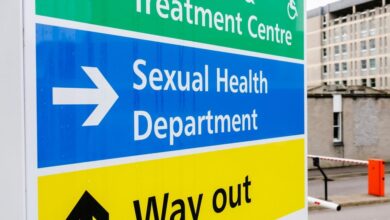‘Traumatic’ Covid impact on young people’s mental health

More than a fifth of children and young people are struggling with mental health problems, and the prevalence of eating disorders has risen, an NHS survey has found.
The Mental Health of Children and Young People in England 2023 survey was published last week and found that 20.3% of eight- to 16-year-olds had a probable mental disorder.
“When you have something as traumatic as a pandemic… you get an increase in all kinds of mental health problems”
Kevin Gournay
Probable mental disorders were even more common among 17-19-year-olds, at 23.3%.
Among the 17-25 age range, the rate of poor mental health in 2023 was around twice as high in girls and young women than in boys and young men.
For 11-16-year-olds, probable mental disorders were present in 22.6% of those surveyed – with roughly equal distribution by gender.
The survey explained that there had been a rise in probable mental disorders in children and young people between 2017 and 2020 and the rate had remained at the higher level since then.
Meanwhile, the survey found that the prevalence of eating disorders had increased substantially.
Among 17-19-year-olds, the rate of eating disorders rose from 0.8% in 2017 to 12.5% in 2023, and for 11-16-year-olds it increased from 0.5% to 2.6%.
According to the survey, 5.9% of 20-25-year-olds had an eating disorder in 2023.
Professor Kevin Gournay, a registered mental health nurse, psychologist and researcher, said the mental health of young people would have been influenced by the Covid-19 emergency period, and in particular the first lockdowns in 2020.

Kevin Gournay
“When you have something as traumatic as a pandemic, and we’ve also seen this [in international research] for wars, you get an increase in all kinds of mental health problems,” he told Nursing Times.
Addressing the eating disorder statistics especially, Professor Gournay said the longer-term impact of the pandemic was only now be becoming clear.
He said: “If you think about the impact of 2020, in particular, those who were aged eight, nine or 10 in that year are now coming into their teenage years, which is where you’ll see more eating disorders develop.
“One difficulty with Covid is we have a lot of short term studies but no long term ones, which will measure impact over time.”
The NHS survey also collected data on the link between probable mental disorders and self harm.
It found that 5.9% of children aged 8-16, and 10.6% of 17-24-year-olds who had a probable mental disorder reported having attempted to harm in the past month, compared to less than 1% of those without one.
Responding to the figures, NHS Providers chief executive Saffron Cordery called on the UK Government to “get a grip” on what she called a “persistent crisis”.
She referred to “hard-working but stretched to the limit” mental health services which are understaffed.
Ms Cordery said that, currently, it was “impossible” for nurses, and other mental health care staff, to reduce the length of waits for help.
“Far too many youngsters are stuck in the queue for diagnosis and the right support”
Saffron Cordery
“We need sustainable levels of funding in the right areas and more capital investment to boost the ability of trusts, as well as schools and councils, to meet people’s needs and to modernise out-of-date facilities to give patients first-class care,” she said.
Ms Cordery continued: “Getting help and support to children and young people as soon as possible is critical for their future life chances, wellbeing and social development – whether that’s in mental health, hospital or community settings.
“Far too many youngsters are stuck in the queue for diagnosis and the right support.
“With almost 1.9million people in England on the waiting list for mental health help and demand growing, NHS trusts are very worried about so many people, particularly children and young people, not getting the support and treatment they need.”
NHS Confederation Mental Health Network chief executive Sean Duggan also said more investment was needed to meet demand.
Specifically, Mr Duggan said children and young peoples’ mental health services were “historically underfunded”, and that the data showed the need to expand mental health support teams into all schools.
He added: “It is worrying [the rates of probable mental disorders are] still much higher than before the pandemic.
“These are all young people who will benefit from specialist mental health support and are unlikely to get better without it.
“But we know there is already a significant treatment gap in the number of children and young people with a mental disorder able to access specialist mental health services and any increase in prevalence will make this even worse.
“While our members have been working really hard to ensure that children and young people can access support as soon as possible, it has been very challenging due to the huge increase in demand.”

Claire Murdoch
NHS England mental health director Claire Murdoch said the report was evidence of “continued unprecedented pressures faced by young people”, and that it demonstrated the demand on NHS children’s mental health services.
She said that more mental health support teams in schools and colleges would be in operation by 2025, and that by then they would cover more than 50% of the country’s students.
“The NHS is providing support for more children and young people than ever before – we have already supported over 700,000 children and young people with their mental health this year and also seen a 47% increase in young people being treated for eating disorders compared to pre-pandemic,” said Ms Murdoch.
She continued: “NHS staff are working harder than ever to meet the increased demand and we have fast-tracked mental health support for millions of pupils in schools and colleges, as well as significantly expanding the children’s mental health workforce.
“Our partners, especially in the education, voluntary and social care sectors, also have a critical role to play in supporting this effort.
“It is vital that any child or young person struggling, or their family, reaches out for help so they can get the care they need.”







